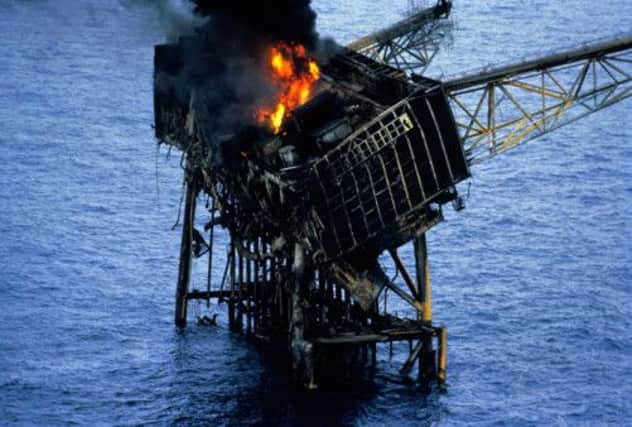Euan McColm: Remembering Piper Alpha


By the end of the night, 167 of them were dead. Only 61 survived.
You may have seen a remarkable film – Fire In The Night – broadcast this week to mark the 25th anniversary of the Piper Alpha disaster (if not, I urge you to seek it out on the BBC’s iPlayer).
Advertisement
Hide AdAdvertisement
Hide AdIt’s an elegant, compelling piece; a story told simply and powerfully by a handful of those who made it home to their loved ones after what should have been just another shift.
In hearing these tales of survival, I was struck by the ordinariness of the men involved. Their experiences – and their responses – were extraordinary, yes, but they were just men trying to do their jobs. Everyone on that platform had a right to expect to go home when work was done.
The day after the film was broadcast, MPs debated the disaster: a quarter of a century on, Piper Alpha was a constant reminder of the potentially devastating consequences of the mismanagement of health and safety issues.
If that’s true, then we should be doubly concerned by legislation from Westminster that further erodes workers’ rights.
Come 1 October, provisions in the Enterprise and Regulatory Reform Act will make it all the more difficult for those injured – or for the loved ones of those killed – at work to hold employers and their insurers to account.
Buried in the act is a clause that removes, from employers, statutory liability for workplace accidents. Anyone injured at work will no longer be able to rely on that protection in a court action for compensation. Instead, it will be incumbent on the victim to establish common law negligence on the part of an employer if they are to sue for damages.
If you’re injured at work next week, you’ll have the reassurance at least that you can make a strong claim against your employer. If you’re injured in October, or later, you’ll have no such luxury.
In many cases, the onus to prove employer responsibility will pass to the victim. Meanwhile, employers will no longer have to show that they did everything in their power to prevent accidents, but simply that they did something.
Advertisement
Hide AdAdvertisement
Hide AdThe lazy spin around this is that changes to the law will cut down on the sort of “ambulance chaser” legal cases where someone chances their luck to make a few quid out of a twisted ankle or, perhaps, a “back injury”; this is legislation that makes things more difficult for those who are at it.
It’s true that will be a consequence, but that’s cover for legislation that acts against the interests of victims. The burden of injury – possibly career-ending – is bad enough. But soon there will also be the burden of making a case against a company whose loyalty is to shareholders, not workers, and whose insurers are driven by the desire not to pay out.
Health and safety at work has improved hugely in recent years and there’s an argument that financial concerns have played a big part in that. If money talks, then compensation claims come in language business understands.
In 1991/92, 368 people died in workplace accidents in the UK. By 2012/13, that had fallen to 148, of whom 22 lost their lives in Scotland.
Can we really believe that the risk of financial penalty didn’t play its part in the improvement of safety standards? It’s not only the change to the law around compensation that causes concern. Last year, Business Secretary Vince Cable announced sweeping changes to the way the Health and Safety Executive operates.
A number of businesses would no longer face what he described as “burdensome” inspections, while more than 3,000 regulations would be scrapped or rewritten.
Since April this year, the law has explicitly forbidden proactive inspections in all but what are described as “high-risk areas”. That legislation came after a two-year period during which HSE inspectors were ordered by the government to back off from a number of sectors.
This was sold by Cable and the government as a war on unnecessary bureaucracy, as a blade of common sense to slash through restricting red tape.
Advertisement
Hide AdAdvertisement
Hide AdLook a little closer and that doesn’t stack up. Stirling University’s Professor of Occupational Health Policy Research, Rory O’Neill, has revealed that of 258 fatalities in HSE-enforced workplaces, 137 happened in sectors which are no longer inspected.
Those uninspected industries include agriculture, quarries, plastics, and electricity generation and supply, all of which are recognised by the HSE to be higher risk. The UK’s 1.4 million NHS staff are also cut adrift, with snap inspections no longer deemed necessary.
In its rush to appear business-friendly, the Conservative-led coalition at Westminster has carved away important – some might say bare minimum – protection for workers.
The men who lost their lives on Piper Alpha, or in the sea below it, knew they were doing dangerous work but they had the same right as any worker to expect that, when it came to ensuring their safety, everything that could be done had been done. It’s a reasonable assumption for any worker to make, surely, whether they’re out in the North Sea, in a factory, on a farm, or in a hospital?
In fact, it’s now a reckless assumption.
Of course, decent employers will do what is necessary to meet the highest safety standards, but the government has made life a lot easier for the rogues and the corner-cutters. In some cases “slashing red tape” is code for removing workers’ protection.
And those in the House of Commons this week, solemnly remembering the men who perished on the Piper, have played their part in this with legislation that favours the rights of those who rake in profits and their insurance companies over the rights of those who simply want to make a living. «
Twitter: @euanmccolm